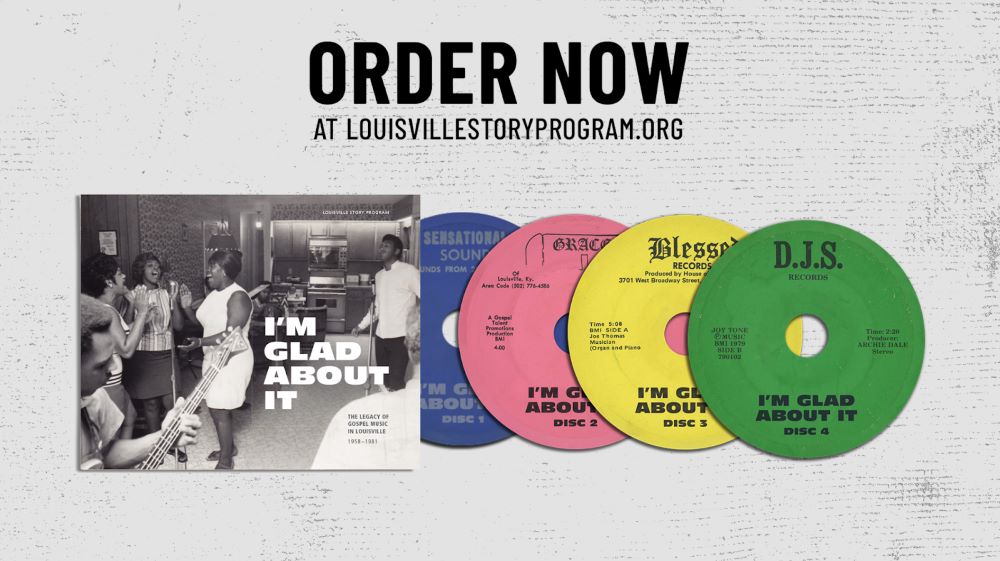LOUISVILLE, KY — The history and influence of Black gospel music is being revitalized in Louisville through a one-of-a-kind cultural preservation initiative known as I’m Glad About It: The Legacy of Gospel Music in Louisville, 1958-1981.
The Louisville Story Program (LSP), an organization that partners with historically misrepresented or underrepresented communities in Louisville to document their stories in their own words, has accompanied elders in the city’s gospel community in a three-year process of bolstering the legacy they helped build through the encapsulation of heart, soul and symphony of sound.
I’m Glad About It: The Legacy of Gospel Music in Louisville, 1958-1981 is a box set featuring 83 archival recordings lovingly restored from the original vinyl, a 208-page full-color book documenting Louisville’s rich Black gospel music legacy written by the people who have built that legacy, and a companion double LP. In addition, LSP has created an extensive digital archive of photos, videos, and 1,000 songs by 125 gospel artists, to which the local gospel community can continue to add in subsequent years. This type of preservation project urgently needs to happen in other cities while the elders who carry the history are still among us, and the Louisville Story Program has created a blueprint of how to go about it.
“With I’m Glad About It, the Louisville Story Program team has not only made an invaluable contribution to gospel music history, but they have done it with perfection, giving the men and women who created this marvelous music their well-deserved props,” said Robert M. Marovich, two-time GRAMMY nominee and editor-in-chief of the Journal of Gospel Music. “Every American city that can claim a rich gospel music heritage needs to take heed of this remarkable collection and follow suit.”
“I’m Glad About It is an extraordinary collection – a lavishly and lovingly compiled and annotated collection of songs, photographs and commentary documenting one of America’s great hotbeds of gospel music,” said Robert F. Darden, founder of the renowned Black Gospel Music Preservation Program at Baylor University. “It is that rare project that elevates while it entertains, even as it celebrates and reveals the startling depth and impact of Louisville’s deep gospel tradition. Oh! And those songs…”
In the mid-20th century, a potent creative movement was documented in Louisville as small recording studios and record labels such as Sensational Sounds, Grace Gospel, and Blessed captured the sound and spirit of the city’s gospel choirs and quartets. Over the years, those powerful, invaluable recordings, and the stories of the women and men behind them, became in danger of being lost forever. LSP partnered with elders in the local gospel community to assure that this rich cultural legacy would live on for generations to come.
“I’m Glad About It is a monumental contribution to our understanding of gospel music and the contribution that Louisville made to its history,” said William Ferris, Joel R. Williamson Eminent Professor of History Emeritus and Senior Associate Director Emeritus, Center for Study of the American South, University of North Carolina at Chapel Hill “The beautifully designed box set with its book and four CDs is a model for what every major city in the nation should do to document and preserve their gospel roots.”
For decades, the passion, hard work and support of countless people across dozens of Black church communities in Louisville have nurtured and sustained a rich gospel music ecosystem. This music has served as a central part of religious practice and as an expression of Black pride, joy, affirmation, love, dignity, determination and hope.
That legacy continues to this day.
GRAMMY-winning Music Director of the Louisville Orchestra, Teddy Abrams, said, “The Louisville Story Program has produced an inspiring, beautiful portrait of our region’s Gospel legacy with this publication. The combination of storytelling, photography, and musical curation is exceptional and vital. Louisville’s Black Gospel traditions are celebrated the way they should be, reinforcing their immense impact on American culture, inviting people to learn about this remarkable history, and securing this critical legacy for future generations. Once again, the Louisville Story Program demonstrates the depth of its vision and mission with this special collection of history and music.”
“This project was made possible by women and men with a zeal for preserving a cultural heritage whose richness and importance cannot be overstated,” said Darcy Thompson, Executive Director of the Louisville Story Program. “Without efforts like theirs, this vital history would be in danger of fading away. And these songs, performed by custodians, truck drivers, cooks, masons, mechanics, upholsterers, dry cleaners, schoolteachers, funeral directors, and other supremely talented artists of modest means, are nothing short of transcendent to this day. They are a testament to the human spirit, to the abundance of brilliance in Louisville’s Black community, and to the power of faith. The authors of I’m Glad About It have ensured that future generations will better understand the shoulders upon which they stand, and that new audiences of all backgrounds can appreciate this rich history and be moved by this powerful music.”
To learn more, please click the purple button below.
2 Comments
Leave A Comment
Written by : Bob Marovich
Bob Marovich is a gospel music historian, author, and radio host. Founder of Journal of Gospel Music blog (formally The Black Gospel Blog) and producer of the Gospel Memories Radio Show.












 Visit Today : 10
Visit Today : 10 This Month : 166
This Month : 166
Voneda Seldin
This is a fantastic piece about the “I’m Glad About It” program! The creation of such a comprehensive archive for Louisville’s Black gospel music scene is a true act of cultural preservation [referencing a detail from the blog post]. Having access to 83 restored recordings, a historical book, and a digital archive sounds like an incredible resource for scholars and music lovers alike.
The article mentions the archive being built over several years. Were there any specific challenges or unexpected discoveries encountered during the program’s development? It would be fascinating to hear more about the process of gathering and preserving this important musical legacy.